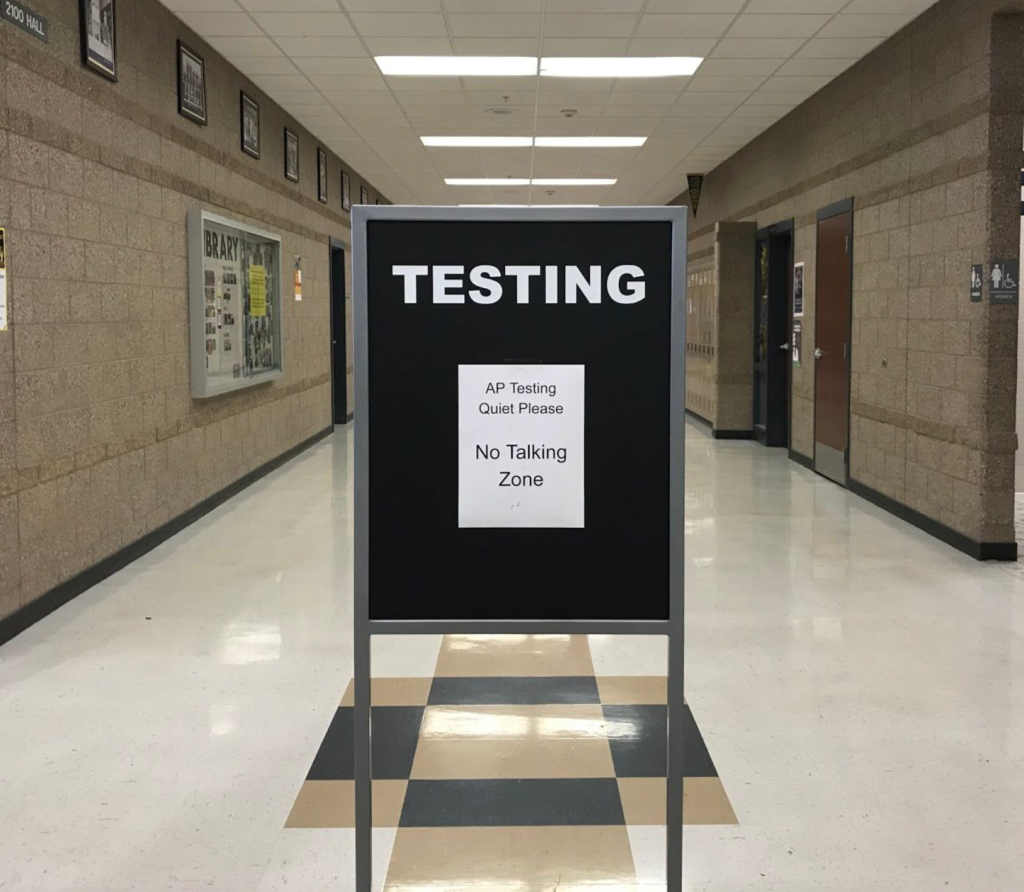By Luke Richards
The date is May 9, 2018. Jane Drinkwater sits down to a clean desk with three freshly sharpened pencils, a few AP booklets, and an anxious yet determined attitude. She’s taking the AP French test. The teacher promptly reads a passage explaining what is and isn’t allowed in the room during the test. Jane fills in some bubbles and hears the teacher carefully read a few more directions before she finally hears the words, “Open your booklet to page 2, you may now begin the test.”
Jane has taken five years of French. Hours and hours of homework, several practice tests, and years of confusion-induced headaches have culminated in a test that she prays to pass. This is the experience shared by millions of other AP students each year.

These tests may seem ubiquitous, but they haven’t existed forever.The non-profit organization that administers the AP tests, College Board, was founded in 1899. It was composed of 12 colleges, and 3 high schools. College Board wanted to bridge the gap between high school and college. Their mindset was that high school and college are “Two halves of a common enterprise”. It wasn’t until the 1950s that the AP program came into existence. There were 10 tests originally offered: mathematics, physics, chemistry, biology, English composition, literature, French, German, Spanish, and Latin. All were priced at $10 a test, which calculated with inflation is actually the exact price it is today, $94.
Since its inception, the program has grown rapidly. According to a summary report put out by College Board, over five million tests were taken in 2018 by about 2.8 million students. In number of tests taken and students examined, there has been roughly a 100% increase since 2007, and 1,000% increase since 1997.
Behind all this growth: Trevor Packer. He is the Senior Vice President of College Board and head of AP. Since 2003, when he became head of the program, he has grown it significantly, with a focus on enabling students with low-income families to participate in AP.
In a recent interview with the Tiger Times, he shared his vision on the future of AP: “That every student who has a desire to attend college will take at least one AP course in high school.” There’s room for growth. This last year, of the 68% of graduating high school students that enrolled in college, only 35% had taken an AP class.
So why are students choosing to take AP courses? The two most common reasons for taking AP classes are 1) for college credit and 2) to bolster their college application relative to their peers.
College applications can be a major source of stress for high school students. An effective college application requires that students begin to plan their application from the beginning of their high school career. This demands that they not only think about the type of courses, but also the academic rigor of those courses, and the impacts of those decisions on their GPA. Additional consideration must be given to ancillary activities such as sports, music, clubs, community service etc.–all of which will have an impact on the final application.
Colleges highly value academic rigor which naturally leads to questions of priority. Should students take a regular class where they have a better chance of getting a good grade or risk taking the more difficult AP course and possibly getting a lower grade?
When asked this question in an interview, the Dean of Admissions at St Lawrence College, Jeff Rickey, responded, “As admissions officers say when we are asked this question, ‘An A in an Advanced Placement class!’ But, seriously, the student should take the most challenging course that is best for him or her. The extra challenge of the AP course may prepare the student better for the challenge of college courses.”
Aside from college applications, an A in an easy class may be preferable to a B in an AP class for scholarships. Few scholarships are offered for taking AP classes, but many scholarships are available for students with high GPA and/or ACT test scores.
College credit is the other major reason most students take AP classes. Jacob Richards, an Orem High alumni, racked up 34 credits from the 9 AP tests that he took at Lakeridge Jr High and Orem High. That’s over two semesters of credits that he tested out of at BYU. At 15 credits a semester, he saved about $5,500 in tuition, and easily $10,000 or more in total costs that he won’t have pay because he’ll graduate sooner. At colleges where tuition is more expensive, AP tests can save you even more.
However, other colleges might not accept AP credits at all. This trend began with only the most selective schools, but now more colleges are beginning to restrict the amount and kind of AP credits they accept. Colleges justify that they want the education they give to be their own, not from a high school.
Kyle Hatch, for example, is an Orem High alumni attending Stanford University. He’s majoring in computer science with a focus on artificial intelligence. In high school, Kyle took AP Biology, Human Geography, US History, Calculus BC, Chemistry, English Literature, French, Psychology, Statistics, and English Language. He got 5s on all but two and yet only received credit for Chemistry and Calculus. Despite the meager two classes he tested out of, Kyle stresses the importance of taking AP classes and the benefits that supplement the possible credit.
“As far as experience, taking lots of AP classes definitely helped to prepare me for the difficulty of classes here at Stanford.” Kyle also noted that some of the AP classes he took did not fully prepare him for the AP test, forcing him to study the material on his own, “which really helped me to learn good study skills.”
The experience of an AP class is perhaps the most important thing a student can gain from taking one. Parallel to Kyle’s remarks, Zach Knappenberger pushes his students to become independent. Knappenberger has taught AP Chemistry at Orem High since 2001, and he describes the hardest things for his students to learn with respect to his two-period class.
“In lab, it’s learning to work on your own. I tend to be pretty hands off and let you struggle though it. In AP lecture, learning to solve problems without steps. It’s taking principles and problem-solving strategies and applying them in unique context.”
He advises students to, “Take the classes not because they can get you college credit, but because they’re classes worth taking.”
Trevor Packer concurs that AP is not about the credit or applications, though they are significant pluses. Citing research conducted by Krista Matern, Jonathan Smith, and the College Board, he indicates that, “The primary benefit of AP is that students who take AP coursework become better prepared for college. Research consistently finds that AP students are more likely to enroll in college, stay in college, do well in their college classes, and graduate on time in four years, unlike the majority of American college students.”
Although taking AP classes evidently prepares students better for college, Knappenberger still recommends that his students take freshman chemistry in college. He emphasized the importance of having a successful freshman year in college: “There’s value to having a positive freshman year of college. College is disorienting independent of the classes. You’re living on your own, trying to figure out your life. The last thing you need to do is compound that with classes that you’re failing because they’re so difficult.”
AP teachers also tend to be more experienced and better educators than alternative options including college professors. College classes are more difficult than high school classes because of the depth of the content and the speed of the course forcing the professor to become more content focused. According to Knappenberger, “High school teachers by definition are not masters of content, they are masters of teaching and, consequently, are more invested in their students, they want them to succeed.”
Current research only strengthens this viewpoint. A study conducted by Brian Patterson and Maureen Ewing found that students that tested out of a college class, “performed the same as, or better than, non-AP students in the subsequent college course related to their AP exam–even after controlling for prior academic achievement and demographic variables.”
Aside from the skills learned individually, taking AP classes can help to bring motivated and driven people together. AP courses are, in a sense, comparable to Ivy league schools. Students that attend top-tier schools stress that it is not their teachers or the school itself that made their education, it was the people they met, and the life-long relationships they formed.
Students desiring to take an AP class, should not let money stand in their way. Financial aid programs are becoming increasingly available, and the number of low-income students in AP classes has doubled since 2003.
Does AP have an advantage over concurrent enrollment? As opposed to basing college credit on a test score, concurrent enrollment provides the opportunity for students to take a college class at the high school, and get credit for both simultaneously.
Brittney Call teaches both concurrent enrollment and AP French classes at OHS. “AP has been known to be an experience that prepares kids for college, and it fulfills that role, where as concurrent enrollment students tend to have the mentality of ‘Oh I’m just going to come in and take the class and get college credit.'” Call continues, “AP kids are more willing to be pushed than my concurrent enrollment kids. Part of it is how AP is designed, and the mentality they come into AP with, and part of it is how concurrent enrollment is designed.”
So what’s the rub? Concurrent enrollment classes limit course credit to a specific college; they are typically non-transferable beyond their sponsoring college. There is, however, a workaround to this. One option is to get an an associates degree at the sponsoring college, which “packages” up all of a student’s classes, including those taken concurrently, and then transfer that degree to another college if desired.
So should you take an AP class? The choice to take an AP class is yours, and hopefully the information provided was able to give you some guidance. As for how many AP classes to take, there are a few things to consider.
The research is conclusive that taking any number of AP classes makes you much more prepared for college than those that don’t. A study conducted by the College Board found that the biggest increase in college success comes from just taking a single AP course. That said, the more AP classes you take, the more prepared you will be for college-level difficulty. Kyle Hatch suggests taking between five and eight.
One thing to consider when choosing how many AP classes to schedule is the time commitment. Evaluate how much time you have and how much you are willing to sacrifice. A serious time commitment may be necessary when you take an AP class, especially if plan on taking and passing the test. It isn’t irregular to have at least an hour of homework per AP class period, and additional study time to pass the test.
As mentioned earlier, it is important for both scholarships and college admissions that you perform well in the AP class, ideally earning an A. Earning an A is often a function of doing your homework every day and studying for every test. When considering your AP course load, it’s important to consider the work necessary to achieve a good grade.
Lastly, if you are interested in a subject, and an AP class is available, you should take it! Packer advises to only take AP classes that you are interested in: “I would not recommend that a student take an AP class that they’re not particularly interested in. With 38 different AP courses, students should only take courses for which they’re interested in digging deeper into the material and developing stronger skills.”
It is building those stronger skills that is the essence of AP. As Knappenberger puts it, “It’s not chemistry. I think it’s the intangible stuff, it’s asking questions, it’s being curious, it’s loving to learn, it’s to not being defensive when you don’t know the answer, it’s working together with other people. It’s not the chemistry, the chemistry is just the vehicle.”
Tiger Times Staff
Latest posts by Tiger Times Staff (see all)
- Life Skills #2 - April 13, 2023
- Life Skills #1 - April 13, 2023
- Life Skills #2 - November 9, 2021





